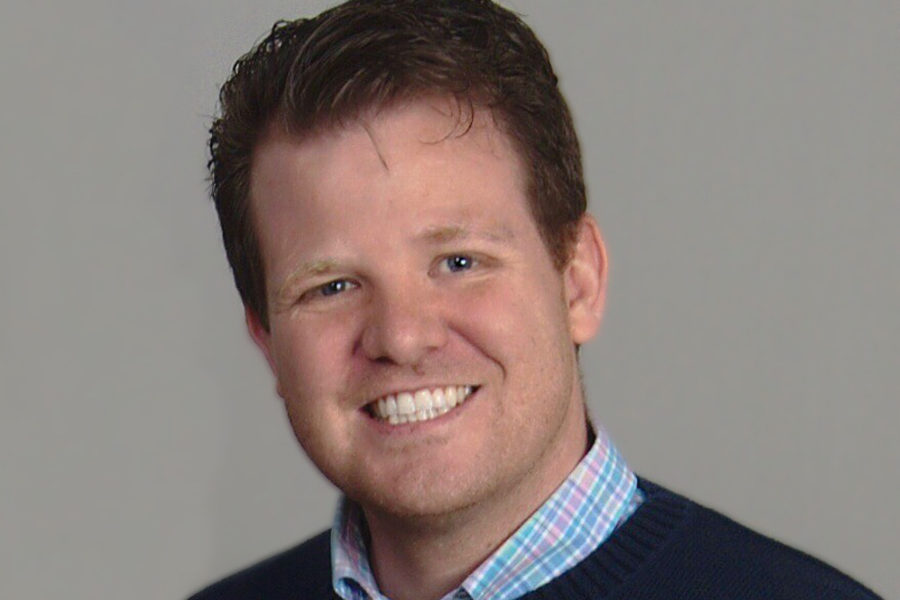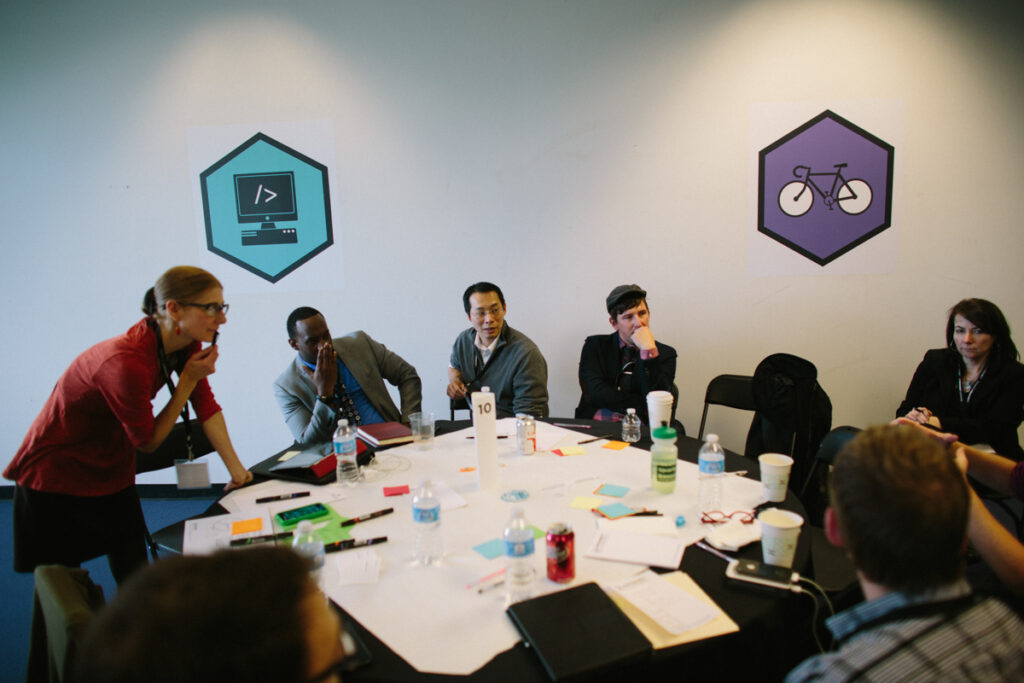
Remake Learning is built on the belief that cross-sector collaboration is the best way to tackle the challenges and opportunities facing educators, learners, and families today.
In addition to regular convenings, celebrations, and funding opportunities, we bring like-minded educators together in coordinated working groups. It’s here that we tackle challenges head-on, together.
LaTrenda Leonard Sherrill and Nick Schiner lead three working groups dedicated to computer science, STEAM, and maker learning. These disciplines are known as heavy hitters in today’s learning landscape. They impart today’s learners with skills they need to succeed—like problem-solving, critical thinking, and collaboration—and can open doors to top career prospects.

Nick and LaTrenda’s groups bring together educators to explore related learner benefits, teaching techniques, and important questions about access and equity. It’s well documented that students of color and students from low-income families have less access to high-quality, relevant, and engaging CS, STEM, and maker learning opportunities.
We recently caught up with LaTrenda and Nick to see what’s been happening and what’s coming up with their groups.
All of our working groups had exciting ends to 2020! Can you give us a quick recap of anything we might have missed?
LaTrenda Leonard Sherrill (LLS): Yes! CSforPGH had a busy end to the year. We launched our CS Learning Lab, re-upped our national commitment to advance CS education, and did some deep, intersectional work around computer science and inclusion.
At the very end of the year, we also awarded $20,000 in funding through our CS Mini Grants. Grants of $2,000 each went to 25 recipients, including the Legacy Arts Project, Omega Psi Phi Fraternity, Incorporated-Omega Phi Chapter, Deer Lakes School District, Catalyst Academy Charter School, Pittsburgh Woolslair, Assemble, Casa San Jose, Tek Start, and Boys & Girls Clubs of Western Pennsylvania, among others.
Nick Schiner (NS): Oh, absolutely! 2020 threw all of us for a loop as we navigated the challenges created or exacerbated by COVID-19, so some pivots were necessary. While we offered several virtual programs, including a summer slate of professional learning and monthly networking events, this year let us take stock of our working group and chart a path forward.
The Collaborative’s steering committee audited and revised our working group’s vision, values, and goals, while setting the stage for an upcoming slate of opportunities and stories in 2021. We can’t wait to share more with you; be on the lookout!
LaTrenda, can you tell us more about the CS Learning Lab? What kind of impact did that project have on participants?
LLS: This wasn’t a long or intricate project, but I was floored by what participants accomplished. The lab paired in-school computer science teachers—we called them our teaching assistants (TAs)—with out-of-school time (OST) partners. It was a way to connect educators from different learning environments and offer OST partners support, mentorship, and time to brainstorm. And wow, did they ever brainstorm!
Our OST organizations were at all different levels of programming and our TAs did a great job of meeting them where they were. Here are some examples from across the board:
- The Shack Neighborhood House in West Virginia worked with their TA to launch a computer science club. The TA helped the OST educator, who was relatively new to computer science, develop beginner coding lesson plans and feel comfortable teaching concepts.
- STEM Coding Lab worked with their TA to expand their offerings from solely coding to robotics.
- M-PowerHouse had established STEM programming already, so they worked with their TA to further develop a culturally relevant FAA drone certification course, integrating HipHopEd curriculum, “edutainment” ideas, and bigger partnerships with area schools and organizations like UPMC.
- In Beaver Falls, an area that doesn’t offer much in-school CS curriculum, a TA helped the Carnegie Free Library design a mechanical exhibit that reinforces computational thinking for young learners and works hand-in-hand with Hello Ruby, a children’s book and an app that teaches programming fundamentals.
Nick, I saw the Collaborative promoting last fall’s EdCamp: Maker Learning. Can you tell us about this?
NS: I’m so glad you asked about this. Digital Promise hosted monthly Edcamp: Maker Learning events during the last quarter of 2020. These events brought maker educators and those interested in learning more about making together from all around the world. Edcamps are free events that are attendee-driven. Educators collaboratively determine topics and sessions are facilitated by educators, who use their experiences to drive conversations.
As a special spotlight, the November event included a panel of Pittsburgh maker educators discussing how they have continued to actualize and support maker learning opportunities throughout the COVID-19 pandemic, wherever our learners are. It’s well known, around the world, that Pittsburgh is a hub for maker learning and participants were incredibly excited to ask questions and learn from the work Nina Barbuto, Dr. Andre Samuel, and Kathryn Vargas are doing on a day-to-day basis. Another Edcamp: Maker Learning took place on Saturday, February 20, and more upcoming dates will be announced soon!
And last but not least, what’s been big in the world of the Pittsburgh STE(A)M Ecosystem?
LLS: Last year, the STE(A)M Ecosystem spent a lot of time supporting the Pennsylvania STEM Coalition. The coalition was formed in May 2020 by a group of ecosystems across the state, to support catalytic projects. Since then, we’ve been hosting bi-weekly convenings with state STEM leaders on various topics, including social justice, Remake Learning Days, and the PA Science Standards! We have so many things lined up this year as a state, and I am happy that Remake Learning and #PghSTEM can play an active role. Anyone from across the state can join the meetings at any time.
Additionally, we finalized our collaborative work on the Hill STEAM Studio, working alongside a number of community collaborators and the leaders of the work, the Hill District Community Development Corporation. Read the full report here!
Lastly, we continued to support the work of the STEM Push Project. This effort is meant to really broaden Black and Brown students’ participation in STEM by standardizing and validating a college admissions pathway that works through pre-college programs. This work has been amazing to be a part of, and Remake Learning will be publishing a playbook to support its documentation and ensure other ecosystems have a blueprint to follow to create their own pathways.
And what are you both looking forward to in the year ahead?
LLS: This year, we are hoping to do a few things:
- Get a really solid sense of computer science in the Pittsburgh region! We are hoping to map out access to computer science in both informal and formal learning spaces.
- Continue supporting the PA STEM Coalition.
- Begin closer conversations with our higher ed partners and community. We really want to bring them into the work that we are doing and begin more conversations about access, particularly in STEM and CS.
NS: I am really looking forward to connecting with more educators throughout the region. Navigating a pandemic hasn’t been easy, particularly for educators, and it was important for our working group to provide support without overburdening those who are most important to us. Our goal for this year is to spotlight incredible maker educators, amplify their work, and create supports for organizations and people working with our learners. Some of those undertakings include:
- The aforementioned Maker Educator Spotlight Series (Know someone you would like to recognize? Nominate them here!)
- Cataloging makerspaces, opportunities, and educators to strengthen the connections within our ecosystem.
- Creating additional synchronous and asynchronous touchpoints for Collaborative members, current and prospective!
How can interested educators get involved in your groups?
LLS: We have a combined CSforPGH and STE(A)M Ecosystem meeting coming up on March 23 at 9:30 am. Educators can also sign up for the CS or STEAM newsletters, join the PghSTEM Facebook group, or contact me directly.
NS: We just scheduled our first meeting of the year for April 6 at 9:30 am. In addition to general working group updates, we will be looking for stakeholders who are interested in contributing to many of the activities mentioned earlier. Also, be sure to sign-up for our newsletter, join our Facebook group, or contact me via email, social media, or by booking time on my calendar!
